You can prepare for Microsoft 70-412 exam with little effort because GreatExam is now at your service to act as a guide to pass Microsoft 70-412 exam. Our Microsoft 70-412 braindumps are rich in variety. We offer Microsoft 70-412 PDF dumps and Microsoft 70-412 VCE. Both are the newest version.
QUESTION 61
Your network contains an Active Directory forest. The forest contains two domains named contoso.com and fabrikam.com. The forest functional level is Windows 2000. The contoso.com domain contains domain controllers that run either Windows Server 2008 or Windows Server 2008 R2. The domain functional level is Windows Server 2008. The fabrikam.com domain contains domain controllers that run either Windows 2000 Server or Windows Server 2003.
The domain functional level is Windows 2000 native. The contoso.com domain contains a member server named Server1 that runs Windows Server 2012 R2.
You need to add Server1 as a new domain controller in the contoso.com domain.
What should you do first?
A. Raise the functional level of the contoso.com domain to Windows Server 2008 R2.
B. Upgrade the domain controllers that run Windows Server 2008 to Windows Server 2008 R2.
C. Raise the functional level of the fabrikam.com domain to Windows Server 2003.
D. Decommission the domain controllers that run Windows 2000.
E. Raise the forest functional level to Windows Server 2003.
Answer: D
Explanation:
Server 2003 is the minimum Domain Functional level for any domain in the forest Windows Server 2012 R2 requires a Windows Server 2003 forest functional level. That is, before you can add a domain controller that runs Windows Server 2012 R2 to an existing Active Directory forest, the forest functional level must be Windows Server 2003 or higher.
http://technet.microsoft.com/en-us/library/cc771294.aspx
QUESTION 62
Your network contains an Active Directory domain named adatum.com.
The domain contains four servers. The servers are configured as shown in the following table.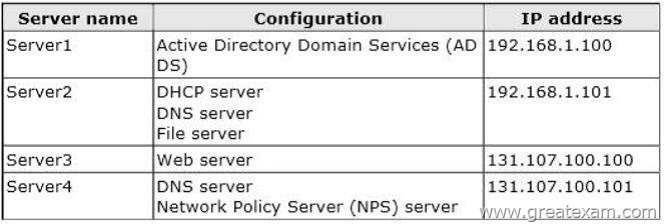
You plan to deploy an enterprise certification authority (CA) on a server named Server5. Server5 will be used to issue certificates to domain-joined computers and workgroup computers.
You need to identify which server you must use as the certificate revocation list (CRL) distribution point for Server5.
Which server should you identify?
A. Server 3
B. Server 2
C. Server 4
D. Server 1
Answer: A
Explanation:
A. We cannot use AD DS because workgroup computers must access CRL distribution point
B. We cannot use File Share because workgroup computers must access CRL distribution point
C. Public facing web server can be used
D. AD DS, Web & File Share only
http://technet.microsoft.com/en-us/library/cc771079.aspx
QUESTION 63
You have a server named Server1 that has the Active Directory Certificate Services server role installed. Server1 uses a hardware security module (HSM) to protect the private key of Server1. You need to ensure that the Active Directory Certificate Services (AD CS) database, log files, and private key are backed up.
You perform regular backups of the HSM module by using a backup utility provided by the HSM manufacturer.
What else should you do?
A. Run the certutil.exe command and specify the -backupkey parameter.
B. Run the certutil.exe command and specify the -backupdb parameter.
C. Run the certutil.exe command and specify the -backup parameter.
D. Run the certutil.exe command and specify the -dump parameter.
Answer: B
Explanation:
A. Backup the Active Directory Certificate Services certificate and private key
B. Backup the Active Directory Certificate Services database
C. Backup Active Directory Certificate Services
D. Dump configuration information or files
http://technet.microsoft.com/en-us/library/cc732443.aspx#BKMK_backupKey
http://technet.microsoft.com/en-us/library/cc732443.aspx#BKMK_backupDB
http://technet.microsoft.com/en-us/library/cc732443.aspx#BKMK_backup
http://technet.microsoft.com/library/cc732443.aspx#BKMK_dump
QUESTION 64
Your network contains an Active Directory domain named contoso.com.
The domain contains a server named Server1 that runs Windows Server 2012 R2.
Server1 has the Active Directory Federation Services (AD FS) server role installed.
Adatum.com is a partner organization.
You are helping the administrator of adatum.com set up a federated trust between adatum.com and contoso.com. The administrator of adatum.com asks you to provide a file containing the federation metadata of contoso.com.
You need to identify the location of the federation metadata file.
Which node in the AD FS console should you select? To answer, select the appropriate node in the answer area.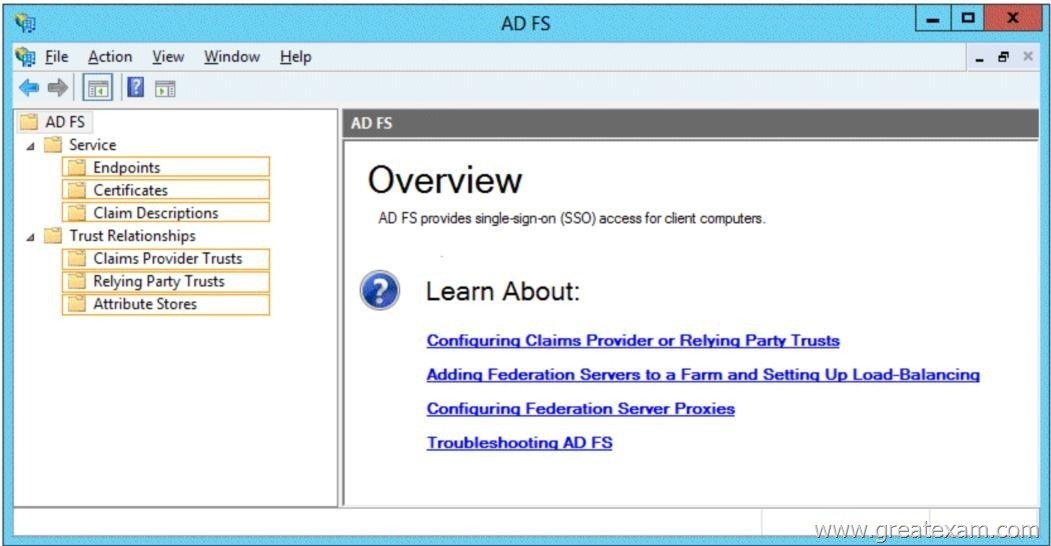
Answer: 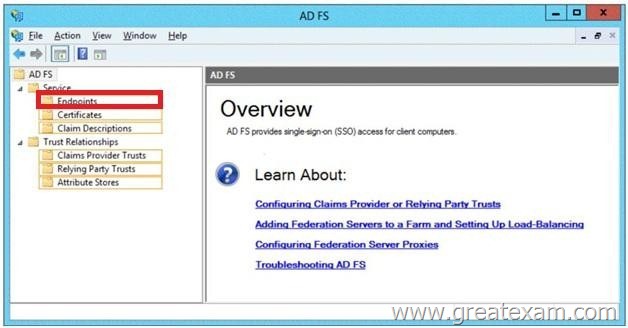
Explanation:
http://blogs.msdn.com/b/card/archive/2010/06/25/using-federation-metadata-to-establish-a-relying-party-trustinad-fs-2-0.aspx
QUESTION 65
Your network contains four Active Directory forests.
Each forest contains an Active Directory Rights Management Services (AD RMS) root cluster.
All of the users in all of the forests must be able to access protected content from any of the forests.
You need to identify the minimum number of AD RMS trusts required.
How many trusts should you identify?
A. 3
B. 6
C. 12
D. 16
Answer: C
Explanation:
https://technet.microsoft.com/en-us/library/dd772659%28v=ws.10%29.aspx?f=255&MSPPError=-2147217396
The number of AD RMS trusts required to interact between all AD RMS forests can be defined by using the following formula: N*(N-1).
QUESTION 66
Your network contains an Active Directory domain named contoso.com.
The domain contains a server named Server1 that runs Windows Server 2012 R2.
Server1 has the Active Directory Rights Management Services server role installed.
The domain contains a domain local group named Group1.
You create a rights policy template named Template1.
You assign Group1 the rights to Template1.
You need to ensure that all the members of Group1 can use Template1.
What should you do?
A. Configure the email address attribute of Group1.
B. Convert the scope of Group1 to global.
C. Convert the scope of Group1 to universal.
D. Configure the email address attribute of all the users who are members of Group1.
Answer: D
Explanation:
When a user or group is created in Active Directory, the mail attribute is an optional attribute that can be set to include a primary email address for the user or group. For AD RMS to work properly, this attribute must be set because all users must have an email attribute to protect and consume content.
http://social.technet.microsoft.com/wiki/contents/articles/13130.ad-rms-troubleshooting-guide.aspx
QUESTION 67
Your network contains a server named Server1 that runs Windows Server 2012 R2. Server1 has the Hyper-V server role installed. Server1 hosts 10 virtual machines that run Windows Server 2012 R2.
You add a new server named Server2. Server2 has faster hard disk drives, more RAM, and a different processor manufacturer than Server1.
You need to move all of the virtual machines from Server1 to Server2.
The solution must minimize downtime.
What should you do for each virtual machine?
A. Perform a quick migration.
B. Perform a storage migration.
C. Export the virtual machines from Server1 and import the virtual machines to Server2.
D. Perform a live migration.
Answer: C
Explanation:
C. Other options require same CPU family and cluster
http://technet.microsoft.com/en-us/library/hh848491.aspx
http://technet.microsoft.com/en-us/library/hh848495.aspx
http://technet.microsoft.com/en-us/library/jj628158.aspx
The different processor manufacturer is the key here.
Storage, Live, and Quick all require same manufacturer.
QUESTION 68
You have a datacenter that contains six servers.
Each server has the Hyper-V server role installed and runs Windows Server 2012 R2.
The servers are configured as shown in the following table.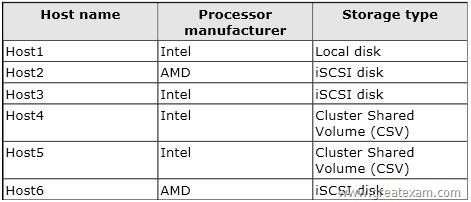
Host4 and Host5 are part of a cluster named Cluster1.
Cluster1 hosts a virtual machine named VM1.
You need to move VM1 to another Hyper-V host.
The solution must minimize the downtime of VM1.
To which server and by which method should you move VM1?
A. To Host3 by using a storage migration
B. To Host6 by using a storage migration
C. To Host2 by using a live migration
D. To Host1 by using a quick migration
Answer: A
Explanation:
A. Host3 is the only option to allow minimum downtime and has same processor manufacturers
B. Live Storage Migration requires same processor manufacturers
C. Live migration requires same same processor manufacturers
D. Quick migration has downtime
NOTE: Exam may have more options but same answer
http://technet.microsoft.com/en-us/library/dd446679(v=ws.10).aspx
http://technet.microsoft.com/en-us/library/hh831656.aspx
http://technet.microsoft.com/en-us/library/jj628158.aspx
QUESTION 69
Your network contains an Active Directory domain named contoso.com. The domain contains two member servers named Server1 and Server2. All servers run Windows Server 2012 R2. Server1 and Server2 have the Failover Clustering feature installed. The servers are configured as nodes in a failover cluster named Cluster1. Cluster1 hosts an application named App1.
You need to ensure that Server2 handles all of the client requests to the cluster for App1.
The solution must ensure that if Server2 fails, Server1 becomes the active node for App1.
What should you configure?
A. Affinity-None
B. Affinity-Single
C. The cluster quorum settings
D. The failover settings
E. A file server for general use
F. The Handling priority
G. The host priority
H. Live migration
I. The possible owner
J. The preferred owner
K. Quick migration
L. the Scale-Out File Server
Answer: J
Explanation:
http://blogs.msdn.com/b/clustering/archive/2008/10/14/9000092.aspx
The preferred owner in a 2 server cluster will always be the active node unless it is down.
QUESTION 70
Your network contains an Active Directory domain named contoso.com. The domain contains two member servers named Server1 and Server2. All servers run Windows Server 2012 R2.
Server1 and Server2 have the Failover Clustering feature installed.
The servers are configured as nodes in a failover cluster named Cluster1.
You add two additional nodes to Cluster1.
You need to ensure that Cluster1 stops running if three nodes fail.
What should you configure?
A. Affinity-None
B. Affinity-Single
C. The cluster quorum settings
D. The failover settings
E. A file server for general use
F. The Handling priority
G. The host priority
H. Live migration
I. The possible owner
J. The preferred owner
K. Quick migration
L. the Scale-Out File Server
Answer: C
Explanation:
The quorum configuration in a failover cluster determines the number of failures that the cluster can sustain.
http://technet.microsoft.com/en-us/library/cc731739.aspx
QUESTION 71
Your network contains an Active Directory domain named contoso.com. The domain contains two member servers named Server1 and Server2. All servers run Windows Server 2012 R2. Server1 and Server2 have the Failover Clustering feature installed.
The servers are configured as nodes in a failover cluster named Cluster1.
You configure File Services and DHCP as clustered resources for Cluster1.
Server1 is the active node for both clustered resources.
You need to ensure that if two consecutive heartbeat messages are missed between Server1 and Server2, Server2 will begin responding to DHCP requests.
The solution must ensure that Server1 remains the active node for the File Services clustered resource for up to five missed heartbeat messages.
What should you configure?
A. Affinity-None
B. Affinity-Single
C. The cluster quorum settings
D. The failover settings
E. A file server for general use
F. The Handling priority
G. The host priority
H. Live migration
I. The possible owner
J. The preferred owner
K. Quick migration
L. the Scale-Out File Server
Answer: D
Explanation:
The number of heartbeats that can be missed before failover occurs is known as the heartbeat threshold
http://technet.microsoft.com/en-us/library/dn265972.aspx
http://technet.microsoft.com/en-us/library/dd197562(v=ws.10).aspx
http://blogs.msdn.com/b/clustering/archive/2012/11/21/10370765.aspx
QUESTION 72
Your network contains an Active Directory domain named contoso.com. The domain contains two member servers named Server1 and Server2 that run Windows Server 2012 R2.
You configure a new failover cluster named Cluster1. Server1 and Server2 are nodes in Cluster1. You need to configure the disk that will be used as a witness disk for Cluster1.
How should you configure the witness disk? To answer, drag the appropriate configurations to the correct location or locations. Each configuration may be used once, more than once, or not at all. You may need to drag the split bar between panes or scroll to view content.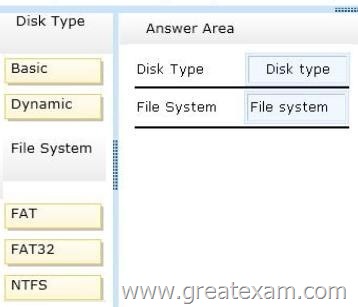
Answer: 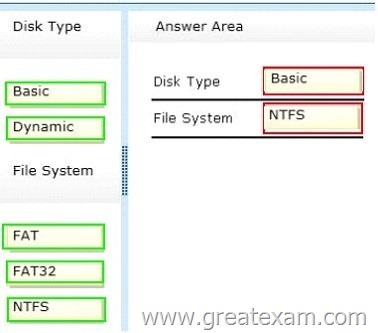
Explanation:
http://technet.microsoft.com/en-us/library/jj612870.aspx#BKMK_witness
QUESTION 73
Your network contains an Active Directory forest named contoso.com that contains a single domain. The forest contains three sites named Site1, Site2, and Site3. Domain controllers run either Windows Server 2008 R2 or Windows Server 2012 R2.
Each site contains two domain controllers. Site1 and Site2 contain a global catalog server.
You need to create a new site link between Site1 and Site2.
The solution must ensure that the site link supports the replication of all the naming contexts.
From which node should you create the site link? To answer, select the appropriate node in the answer area.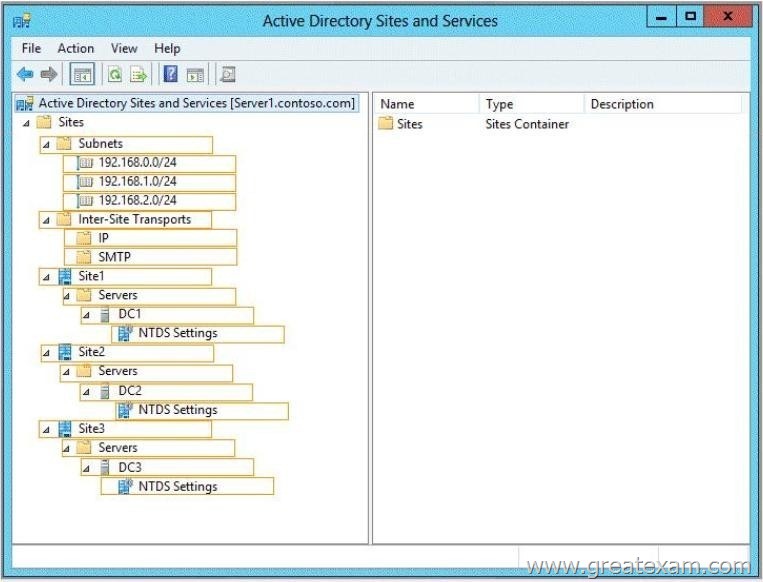
Answer: 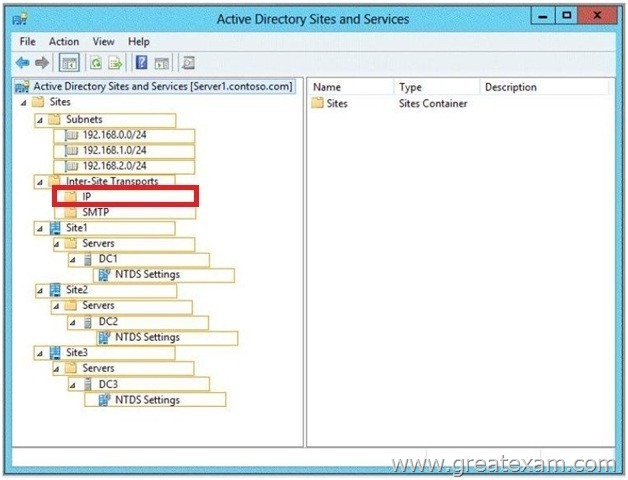
QUESTION 74
Your network contains an Active Directory domain named adatum.com. All servers run Windows Server 2012 R2. All domain controllers have the DNS Server server role installed.
You have a domain controller named DC1. On DC1, you create an Active Directory-integrated zone named adatum.com and you sign the zone by using DNSSEC.
You deploy a new read-only domain controller (RODC) named R0DC1.
You need to ensure that the contoso.com zone replicates to R0DC1.
What should you configure on DC1? To answer, select the appropriate tab in the answer area.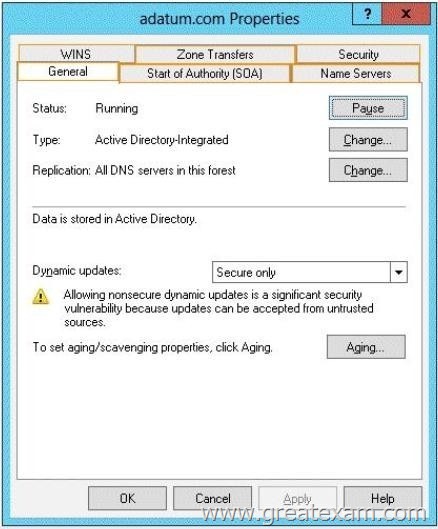
Answer: 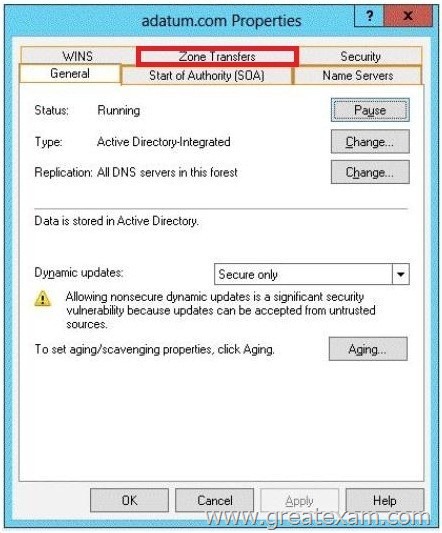
Explanation:
http://technet.microsoft.com/en-us/library/cc781340(v=ws.10).aspx
For additional servers to host a zone, zone transfers are required to replicate and synchronize all copies of the zone used at each server configured to host the zone.
QUESTION 75
You have a server named Server1 that runs Windows Server 2012 R2. Server1 has a single volume that is encrypted by using BitLocker Drive Encryption (BitLocker). BitLocker is configured to save encryption keys to a Trusted Platform Module (TPM). Server1 is configured to perform a daily system image backup. The motherboard on Server1 is upgraded.
After the upgrade, Windows Server 2012 R2 on Server1 fails to start.
You need to start the operating system on Server1 as soon as possible.
What should you do?
A. Start Server1 from the installation media. Run startrec.exe.
B. Move the disk to a server that has a model of the old motherboard.
Start the server from the installation media.
Run bcdboot.exe.
C. Move the disk to a server that has a model of the old motherboard.
Start the server. Run tpm.msc.
D. Start Server1 from the installation media. Perform a system image recovery.
Answer: D
Explanation:
Encryption keys are lost. Nothing mentioned about password/keys recovery.
My point is that the only way is to restore the server from a backup.
http://social.technet.microsoft.com/Forums/windows/en-US/6b34b4da-b1e2-4038- 8d6d192f973cadea/usingsystem-image-with-a-bitlocker-system-drive
QUESTION 76
You have a test server named Server1 that is configured to dual-boot between Windows Server 2008 R2 and Windows Server 2012 R2.
You start Server1 and you discover that the boot entry for Windows Server 2008 R2 no longer appears on the boot menu.
You start Windows Server 2012 R2 on Server1 and you discover the disk configurations shown in the following table.
You need to restore the Windows Server 2008 R2 boot entry on Server1.
What should you do?
A. Run bootrec.exe and specify the /scanos parameter.
B. Run bcdedit.exe and specify the /create store parameter.
C. Run bootcfg.exe and specify the /copy parameter.
D. Run bootrec.exe and specify the /rebuildbcd parameter.
Answer: D
QUESTION 77
Hotspot Question
You have a server named Server1 that runs Windows Server 2012 R2.
Server1 has access to disks that connect to a RAID controller, iSCSI disks, and disks connected to a SCSI controller.
You plan to use a tiered storage space on Server1.
You need to identify which storage controller and volume type you must use for the tiered storage space.
Which storage components should you use? To answer, select the appropriate options in the answer area.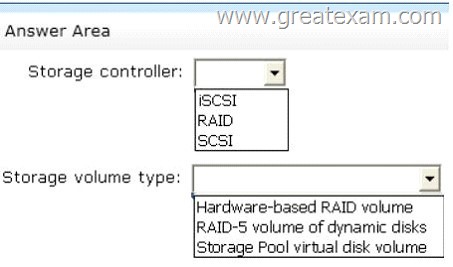
Answer: 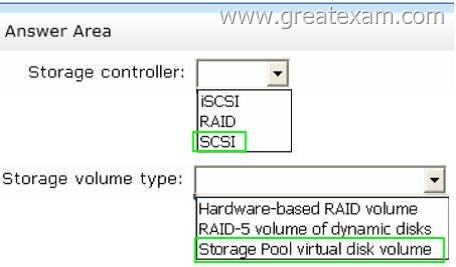
QUESTION 78
Your network contains an Active Directory forest named contoso.com. The forest contains a single domain. The forest contains three Active Directory sites named SiteA, SiteB, and SiteC. The sites contain four domain controllers.
The domain controllers are configured as shown in the following table.
An IP site link exits between each site.
You discover that the users in SiteC are authenticated by the domain controllers in SiteA and SiteB.
You need to ensure that the SiteC users are authenticated by the domain controllers in SiteB, unless all of the domain controllers in SiteB are unavailable.
What should you do?
A. Create a site link bridge.
B. Create additional connection objects for DC3 and DC4.
C. Create additional connection objects for DC1 and DC2.
D. Increase the cost of the site link between SiteA and SiteC.
Answer: D
Explanation:
http://technet.microsoft.com/en-us/library/dd277430.aspx#XSLTsection126121120120
QUESTION 79
You have a file server named Server1 that runs Windows Server 2012 R2.
The folders on Server1 are configured as shown in the following table.
A new corporate policy states that backups must use Windows Azure Online Backup whenever possible.
You need to identify which technology you must use to back up Server1.
he solution must use Windows Azure Online Backup whenever possible.
What should you identify? To answer, drag the appropriate backup type to the correct location or locations. Each backup type may be used once, more than once, or not at all. You may need to drag the split bar between panes or scroll to view content.
Answer: 
Explanation:
http://technet.microsoft.com/en-us/library/hh831761.aspx
QUESTION 80
You have a server named File1 that runs Windows Server 2012 R2. File1 has the File Server role service installed.
You plan to back up all shared folders by using Windows Azure Online Backup.
You download and install the Windows Azure Online Backup Service Agent on File1.
You need to ensure that you use Windows Server Backup to back up data to Windows Azure Online Backup.
What should you do?
A. From Computer Management, add the File1 computer account to the Backup Operators group.
B. From the Services console, modify the Log On settings of the Windows Azure Online Backup
Service Agent.
C. From Windows Server Backup, run the Register Server Wizard.
D. From a command prompt, run wbadmin.exe enable backup.
Answer: C
Explanation:
http://blogs.technet.com/b/windowsserver/archive/2012/03/28/microsoft-online-backupservice.aspx
Microsoft Certification 70-412 certificate are those engaged in IT industry’s dream. You need to choose the professional training by GreatExam Microsoft 70-412 practice test. GreatExam will be with you, and to ensure the success wherever you may increase pursuit your career. Let GreatExam take all your heart, let the dream to reality!
Comments are closed.